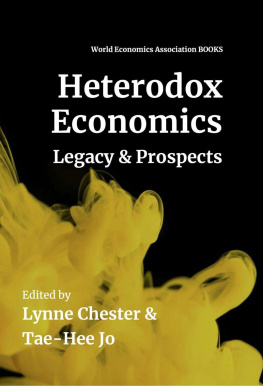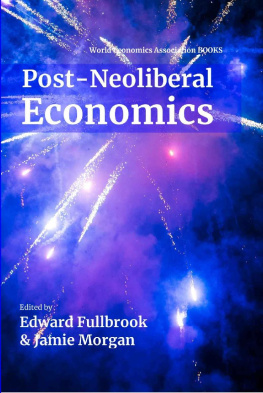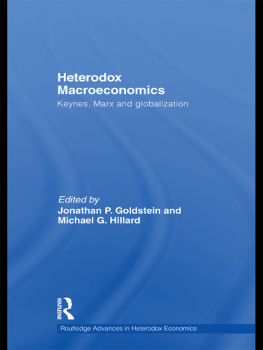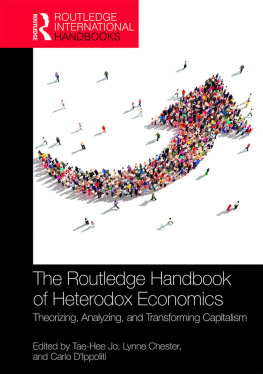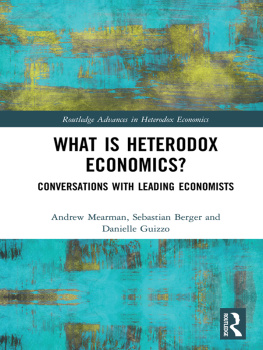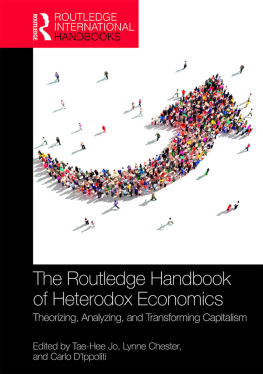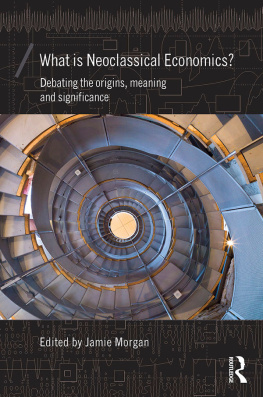Heterodox Economics: Legacy and Prospects
Lynne Chester and Tae-Hee Jo
World Economics Association Books
Copyright 2022 Lynne Chester and Tae-Hee Jo
All rights reserved.
ISBN: 978-1-911156-61-1 (paperback)
978-1-911156-62-8 (eBook, Kindle)
Cover image: picjumbo.com
Cover design: Steven Methven
Published by World Economics Association, Bristol, UK
www.worldeconomicsassociation.org
The World Economics Association (WEA) was launched on May 16, 2011. Already over 14,500 economists and related scholars have joined. This phenomenal success has come about because the WEA fills a huge gap in the international community of economists the absence of a professional organization which is truly international and pluralist.
The World Economics Association seeks to increase the relevance, breadth and depth of economic thought. Its key qualities are worldwide membership and governance, and inclusiveness with respect to: (a) the variety of theoretical perspectives; (b) the range of human activities and issues which fall within the broad domain of economics; and (c) the study of the worlds diverse economies.
The Associations activities centre on the development, promotion and diffusion of economic research and knowledge and on illuminating their social character.
The WEA publishes books, three open-access journals (Economic Thought, World Social and Economic Review and Real-World Economics Review), a bi-monthly newsletter, blogs, holds global online conferences, runs a textbook commentaries project and an eBook library.
For Frederic S. Lee and John F. Henry
A critical and surprisingly novel collection, by an outstanding group of contributors, that explores the nature of, and prospects for, heterodoxy from numerous angles. It is not always the case that an edited collection yields a set of contributions that cohere around the intended theme. This one does. Tony Lawson, Emeritus Professor of Economics and Philosophy, Faculty of Economics, University of Cambridge (UK)
The unravelling of the predominant neoliberal model provides a timely opportunity to freshly examine the current state of heterodox economic alternatives. With original and sagely crafted papers, this new edited volume of scholarship from senior and junior scholars covers economic history, theory, ideology, methodology, interdisciplinarity, and relevance of and limits to pluralism, and will assuredly energize heterodox economist practitioners, as intended. Deborah M. Figart, Distinguished Professor Emerita of Economics, Stockton University (USA)
This book, co-edited by Chester and Jo, is extraordinarily necessary and welcome. The set of authors and perspectives that they have managed to bring together showcases the intellectual soundness of contemporary heterodox economics, and contributes, along with other recent titles, to change the conversation and question the power structures that sustain mainstream academic economics that is simultaneously cause and consequence of the exhausted hegemonic model of contemporary capitalism (neoliberal, financialised, colonial, patriarchal and ecologically predatory), which must be overcome. Professor Jorge Garcia-Arias, University of Len (Spain), and SOAS, University of London (UK)
This timely volume adds to the rich debate and thinking about the role and future of heterodox economics. The contributors explore these issues in new ways that will invigorate our understanding of the potential for heterodox perspectives to make a difference. Stephanie Seguino, Professor of Economics, University of Vermont (USA)
This timely and topical compilation is not just another volume that reflects the state, issues, and perspectives of heterodoxys community (and its relation with the mainstream). It is also a unique balance sheet of the relevant developments of the last decade, discussing diversity and convergence among heterodoxies and their weaknesses and strengths, and it does so not only in theory and policy but particularly within AND outside academia. Wolfram Elsner, Professor of Economics (retired), University of Bremen (Germany) and Editor-in-Chief, Review of Evolutionary Political Economy
The essays gathered here by Chester and Jos promise to be impactful on our understanding of the past and present of heterodox economics. More importantly, by focusing on questions of ideology, pluralism and interdisciplinarity, they crystalise its future. Andrew Mearman, Associate Professor of Economics, University of Leeds (UK)
One may wonder why we need another book on heterodox economics. The answer is quite simple: heterodoxy has yet to enjoy any significant successes in replacing economic orthodoxy as the dominant source of policy. As a consequence, we continue to witness widespread inequality, poverty, and injustice, not to mention a planet on fire, as the direct result of the recommendations of our mainstream colleagues. This new work not only critiques and draws lessons from the earlier volumes, but it lays out a fresh perspective regarding how we can most effectively leverage our strengths into a movement that can finally put real-world, civilized economics at the forefront of our discipline. John T. Harvey, Professor of Economics, Texas Christian University (USA)
This very impressive collection of papers by authorities in the field of heterodox economics deals with some major issues, including diversity and the limits to pluralism, multidisciplinarity and the links to other social sciences, and the role of political ideology. It will be essential reading for all those who are critical of mainstream economic theory. John King, Emeritus Professor, La Trobe University (Australia)
This ambitious collection of essays provides the most critical engagement with heterodox economics purposes, strengths, and challenges of our time. Our generation faces a dramatic intrication of multiple crises fuelled by capitalist competition and systemic drive to accumulation, which is also a failure of economic thinking. Contra adverse institutional headwinds, the book lays a firm epistemological ground for heterodox economists, putting them in position to provide social actors the crucial concepts and economic understandings required to confront contemporary hardships and find a collectively desirable way forward. Cdric Durand, Professeur Associ dconomie Politique, Universit de Genve (Switzerland)
The editors and authors of this volume have done an excellent job exploring potential pathways for the future of heterodox economics. While the exact shape of these future pathways is still uncertain, I sincerely hope that they will be informed by the ideas laid out this deep, timely and important volume. Jakob Kapeller, Professor, Institute for Socio-Economics, University of Duisburg-Essen (Germany)
A challenging set of essays on the present state of economic analysis outside the orthodoxy (heterodox economics), its strengths and weaknesses and prospects for the future. Many stimulating thoughts on whether and how heterodox economists should relate to other social sciences and to mainstream economics. Malcolm Sawyer, Emeritus Professor of Economics, University of Leeds (UK)
Heterodox Economics: Legacy and Prospects is required reading for all serious critics of orthodox economics. Edward Fullbrook, Founder and Editor of the Real-World Economics Review
Heterodox Economics: Legacy and Prospects makes an important contribution to the debate regarding the role, importance, and future of heterodox economics. This book makes clear that mainstream economicswith its emphasis on optimization, equilibrium, and mathematical rigorwill limit its ability to consider real-world problems, providing a necessary and continued role for heterodox economics. John P. Watkins, Professor of Economics, Westminster College (USA)
Heterodox economics in its many forms is the result of ongoing contestation of mainstream economic theories, policies, and practices, as well as original theoretical developments and efforts to address social injustices and complex realities across regions. Always challenging and challenged, contemporary heterodox economists are energized by urgency, difficulties, and possibilities for collaboration. What is the result from now long ongoing efforts of building bridges, opening inquiries across approaches, disciplines, and regions, and connecting to practices and interventions outside of academia? This collection addresses ongoing questions about scope, strategies, production of knowledge, and futures of heterodox economics by referring critically to prominent interventions and by offering original viewpoints. The essays inspire a positive attitude about the future for heterodox economics. Zdravka Todorova, Professor of Economics, Wright State University (USA)
Next page
